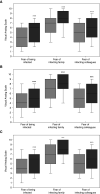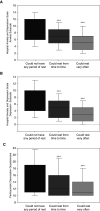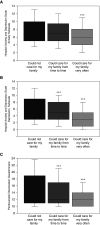Symptoms of Anxiety, Depression, and Peritraumatic Dissociation in Critical Care Clinicians Managing Patients with COVID-19. A Cross-Sectional Study
- PMID: 32866409
- PMCID: PMC7667906
- DOI: 10.1164/rccm.202006-2568OC
Symptoms of Anxiety, Depression, and Peritraumatic Dissociation in Critical Care Clinicians Managing Patients with COVID-19. A Cross-Sectional Study
Abstract
Rationale: Frontline healthcare providers (HCPs) during the coronavirus disease (COVID-19) pandemic are at high risk of mental morbidity.Objectives: To assess the prevalence of symptoms of anxiety, depression, and peritraumatic dissociation in HCPs.Methods: This was a cross-sectional study in 21 ICUs in France between April 20, 2020, and May 21, 2020. The Hospital Anxiety and Depression Scale and the Peritraumatic Dissociative Experience Questionnaire were used. Factors independently associated with reported symptoms of mental health disorders were identified.Measurements and Main Results: The response rate was 67%, with 1,058 respondents (median age 33 yr; 71% women; 68% nursing staff). The prevalence of symptoms of anxiety, depression, and peritraumatic dissociation was 50.4%, 30.4%, and 32%, respectively, with the highest rates in nurses. By multivariable analysis, male sex was independently associated with lower prevalence of symptoms of anxiety, depression, and peritraumatic dissociation (odds ratio of 0.58 [95% confidence interval, 0.42-0.79], 0.57 [95% confidence interval, 0.39-0.82], and 0.49 [95% confidence interval, 0.34-0.72], respectively). HCPs working in non-university-affiliated hospitals and nursing assistants were at high risk of symptoms of anxiety and peritraumatic dissociation. Importantly, we identified the following six modifiable determinants of symptoms of mental health disorders: fear of being infected, inability to rest, inability to care for family, struggling with difficult emotions, regret about the restrictions in visitation policies, and witnessing hasty end-of-life decisions.Conclusions: HCPs experience high levels of psychological burden during the COVID-19 pandemic. Hospitals, ICU directors, and ICU staff must devise strategies to overcome the modifiable determinants of adverse mental illness symptoms.
Keywords: ICU; anxiety; coronavirus; depression; pneumonia.
Figures




Comment in
-
Supporting a Precious Resource: Healthcare Clinicians.Am J Respir Crit Care Med. 2020 Nov 15;202(10):1330-1332. doi: 10.1164/rccm.202009-3576ED. Am J Respir Crit Care Med. 2020. PMID: 32966129 Free PMC article. No abstract available.
References
-
- Gold JA. Covid-19: adverse mental health outcomes for healthcare workers. BMJ. 2020;369:m1815. - PubMed
Publication types
MeSH terms
LinkOut - more resources
Full Text Sources
Medical
Miscellaneous

